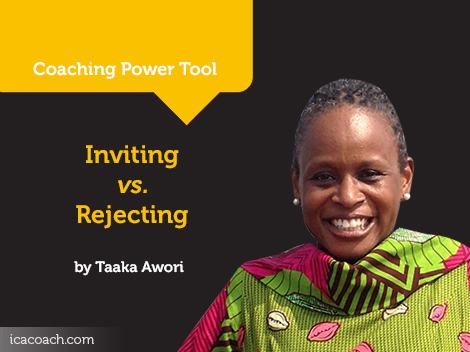
A Coaching Power Tool Created by Taaka Awori
(Leadership Coach, GHANA)
Being a Gracious Host to Difficult Emotions
Introduction
 Managing difficult emotions is one of the hardest things we have to learn in our lives. It is not something that we are taught as children yet it is fundamental to our well-being. In this context, difficult emotions include all those feelings we consider uncomfortable or painful such as frustration, anger, sadness or jealousy. For some, the feelings that cause discomfort are those of joy, gratitude or hope.
Managing difficult emotions is one of the hardest things we have to learn in our lives. It is not something that we are taught as children yet it is fundamental to our well-being. In this context, difficult emotions include all those feelings we consider uncomfortable or painful such as frustration, anger, sadness or jealousy. For some, the feelings that cause discomfort are those of joy, gratitude or hope.
At the onset of a difficult emotion, we may suppress what we are feeling and refuse to accept it is even there. Or we may become totally overwhelmed by the emotion and act on it in ways that are not helpful to ourselves or others. Rumi’s poem the Guest House provides a beautiful metaphor for an alternative, more empowering way of managing these feelings. This power tool is inspired by the poem.
The purpose of the power tool is to support ourselves and ultimately our clients to learn how to use difficult emotions to grow in self- awareness. The hope is that the more self-aware we are, the more opportunities we have to create joy and peace in our lives.
The principles underpinning this power tool are:
Self- Application
As with all power tools the place to start is with one’s self. The process of self- application also provides a useful way to explain how to use the tool. Keeping in mind Rumi’s poem and the principles shared in the introduction, these are the steps I would take in applying this tool to myself:
All of this may not bring absolute clarity in that moment. In other words I may not immediately receive the message from beyond. If this is the case, I consciously leave the door open to receive it when it does come. The importance is the growth in self-awareness that the questions invite.
Even though the preceding steps have been presented in a logical sequence, reality doesn’t quite happen this way often. Thus it is important to remember that becoming a gracious host to difficult emotions is rarely a logical, straightforward or easy process.
Coaching Application
There are a number of ways in which one can use this tool to support coaching clients. Not all clients would welcome this form of exploration of their emotional landscape, so trusting your instinct on when and with which client to use this tool is essential.
Probably the time to use this tool with a client is when they became aware (often with the support of the coach) that their response to uncomfortable emotions is getting in the way of the goals they want to achieve. Or it may be when the client becomes aware that changing their response to painful emotions will enable better achievement of that goal. These goals may be a way of being or it might be something they have to do. Ultimately, the time is right when the client has a good reason and incentive for going on this emotional journey because the journey may not always be easy. The tool then becomes a means for them to navigate this terrain.
Begin by asking the client to think back on the situation in which they felt they could have managed their difficult emotions differently. Following on the same steps used in self-application, the coaching questions may include the following:
As they tell the story, we empathise and show compassion in a way that meets the client where he or she is at the moment.
Encourage the client to resist the temptation to justify the feeling by recounting the story again. They are just to name the feeling.
Even though a client may not remember, this question triggers them to pay attention to what is happening in their body next time it arises.
The next series of questions are to support the client to make meaning of what they were experiencing and to explore how the feeling is serving “as a guide from beyond” to use Rumi’s language. They need not be followed in exact order. You as the coach should take cues from the client and the conversation as to which questions will elicit deeper self- awareness.
As in the self- application process, the deeper meaning or self- awareness for the client may not surface immediately. The questions simply open a door for greater awareness to emerge when the timing is right and the client is ready. Additionally, with the support of a coach, one hopes that once a client has reflected on a situation that occurred in the past, they can practice it in real time when the difficult emotions arise in the future.
Conclusion
Inviting difficult emotions into our inner guest house is not always easy. Yet when we gather the courage to be gracious hosts to those who violently sweep our hearts and empty it of laughter, we may hear the whisper of wisdom from beyond. As we continue to practice this, we are better able to support our clients not as guides or experts but as kindred spirits on the path to greater self- awareness.